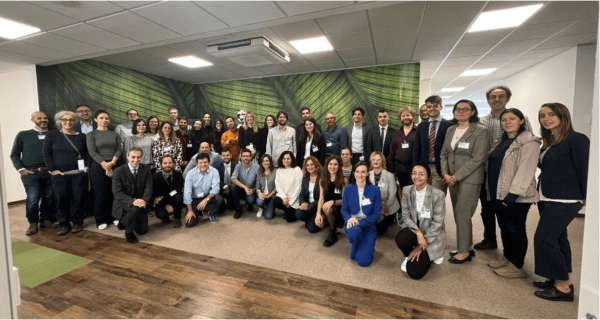Europe Investigates How to Improve the Resilience of Buildings, Urban Areas and Territories Against Climate Change

- The MULTICLIMACT research project will help plan, design and modernise these types of buildings and spaces to adapt to the rise of extreme weather events such as floods, earthquakes and heat waves
- The 24 participants in the initiative will explore new design and planning methods, the impact and use of resilient materials and the development of innovative digital solutions to improve the protection against natural and climate hazards.
A consortium of 24 partners has launched the MULTICLIMACT European research project. This initiative aims to establish a framework and create tools to assess the resilience of buildings, urban areas and territories to the rise of local natural and climatic hazards due to climate change.
In a context where climatic conditions have changed significantly and the frequency of extreme events such as floods, earthquakes and severe heat waves is increasing, there is an urgent need for society to plan, design and modernise the built environment to adapt to and protect against these risks related to climate change.
As explained by Pablo Gilabert, Innovation Director at CYPE, one of the companies participating in this research project, “In certain cases, our built environment can become a driver of vulnerability, instead of being a shelter for citizens” because the systems, materials and technologies used at the time did not consider climate change and the impact it is currently having on these infrastructures.
For this reason, Pablo Gilabert points out that “It is necessary to seek the resilience of these assets, both for the existing ones and those to be built, to improve their response capacity throughout their entire life cycle”. An improvement that, from his point of view, will increase citizens’ well-being and quality of life while reinforcing security.
To carry out this initiative, which started in October 2023 and will run for three and a half years, participants will take advantage of the latest advances in data analytics, modelling and predictive technologies to better anticipate and respond to natural and climate hazards.
Sustainability and energy efficiency
The MULTICLIMACT project focuses on a comprehensive approach by addressing the sustainability and security of communities across the European region, in addition to resilience. To accomplish this, the consortium will address different work streams.
“On-site studies to assess the resilience of existing spaces and buildings, to develop new methods of resilient, sustainable and cost-effective design and planning at different geographical scales, and to research the use of materials and technologies that enhance the durability of buildings are some of the tasks we are tackling,” says Pablo Gilabert.
The information and data collected in this work will be essential to promote more resilient construction in the face of climate change. Therefore, the consortium will also develop digital solutions to monitor and respond to critical situations, improving the use of data for safety and quality of life. In this field, and included in this European research project, CYPE is working on the development of digital models and applications for energy and structural simulation.
Four pilot tests
As the project progresses and the first results are achieved, the participants will carry out four pilot tests in Spain, Italy, Latvia and the Netherlands. “All the chosen locations have different climatic conditions and different social and economic systems, so we will face different environmental disasters,” says CYPE’s Innovation Director.
In Spain, the Barcelona City Council has already started to carry out studies in its public space. More specifically, it has launched a pilot test to install a new draining pavement in the city to study the behaviour of permeable pavements or linear urban sustainable drainage systems (SuDS) and assess their potential to respond to urban drainage problems in the event of heavy rainfall.
This test will be used to evaluate the drainage capacity of the pavement and the quality of the filtered water obtained, as well as to study the behaviour of the pavement with the passing of vehicles and the temperature compared with traditional pavements, to reduce the urban heat island effect.
MULTICLIMACT consortium participants
Project coordinator
RINA CONSULTING SPA (Italia)
Spain
- Fundación Tecnalia Research & Innovation.
- Comsa Sau, Barcelona.
- Brigaid Connect.
- Naturalea Conservació.
- Ajuntament de Barcelona.
Italy
- Rina Consulting Spa.
- Agenzia Nazionale per Le Nuove Tecnologie.
- L’energia E Lo Sviluppo Economico Sostenibile.
- Universita Politecnica delle Marche.
- Universita degli Studi di Camerino.
- Fondazione Centro Euro-Mediterraneosui Cambiamenti Climatici.
- Comune di Camerino, Camerino.
- Live Information System Srl.
Germany
- ICLEI European Secretariat GmbH.
- Universitätsklinikum Aachen.
- Steinbeis Europa Zentrum / Steinbeis Innovation gGmbH.
- Fibristerre Systems GmbH, Berlin.
The Netherlands
- Technische Universiteit Delft.
Sweden
- Kungliga Tekniska Hoegskolan.
Finland
- Uponor Oyj, Vantaa.
Latvia
- Riga Municipal Agency “Riga Energy Agency”.
Greece
- National Center for Scientific Research “Demokritos”.
Portugal
- Universidade do Minho.
CYPE, the global solution for digitalising construction
CYPE is a Spanish technology company with more than 35 years of experience in the development of software for architecture, engineering and construction, which has allowed it to create a global solution to digitalise the construction industry. CYPE applications cover the design phases (conceptualisation, planning, architectural, structural and MEP design and coordination analysis) and execution (plans, manufacturing, procurement). Currently, CYPE occupies a leading position and is considered as one of the companies in the world that has most invested in and committed itself to BIM technology, with its solutions used in 180 countries on five continents.
Contact de press
Víctor M. Romero
Phone number: (+34) 690 29 96 77
Email: [email protected]


